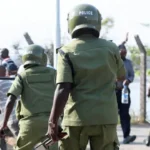Somalia’s government has confirmed that seven al-Shabab militants were killed after launching a daring assault on one of the country’s most secure detention facilities in Mogadishu. The fierce exchange of fire erupted at Godka Jilicow Prison, located near the presidential palace, on Saturday evening. The attack, which began with a massive explosion followed by sustained gunfire, sent shockwaves through the capital and raised new concerns about the resilience of the al-Qaeda-linked militant group.
According to official sources, the heavily armed militants disguised themselves as Somali soldiers in order to infiltrate the high-security prison, which is operated by the National Intelligence and Security Agency (NISA). Godka Jilicow is known to hold several high-profile detainees, including senior members of al-Shabab, making it a symbolic target for the group. Security officials reported that all seven attackers were neutralized after intense fighting that lasted for hours. However, the government did not disclose the number of casualties among its forces, though it expressed deep condolences to the families of those described as “fallen heroes” who lost their lives defending the facility.
Witnesses in Mogadishu described scenes of chaos as gunfire echoed across the city shortly after 4:40 p.m. local time. The attackers reportedly detonated explosives near the prison entrance before engaging security personnel in a fierce battle. Despite the militants’ claim that they had freed all Muslim prisoners and inflicted significant losses on government troops, Somali authorities maintained that the situation was quickly brought under control and no detainees escaped from the prison.
The location of the attack has raised serious security questions, as Godka Jilicow is situated within one of the most fortified areas of Mogadishu, just a short distance from key government institutions. Analysts say the assault is likely to prompt an internal review of intelligence and security operations, as it exposes potential lapses that allowed the militants to breach such a sensitive zone.
Al-Shabab, which has been waging an insurgency against Somalia’s central government for nearly two decades, remains one of the most dangerous militant groups in Africa. The organization has carried out a series of deadly bombings, assassinations, and armed attacks targeting government institutions, security forces, and civilians. Despite losing control of large swathes of territory to Somali and African Union forces, the group continues to operate through sleeper cells and guerrilla-style tactics, maintaining its grip over parts of rural Somalia.
The timing of the prison assault adds to the complexity of Somalia’s ongoing security challenges. Earlier on the same day, authorities had announced the reopening of several key roads in Mogadishu that had been closed for months due to security threats. Officials had cited improved safety conditions in the capital as a sign of progress, but the attack underscored the persistent threat posed by al-Shabab and the group’s ability to strike even in heavily guarded areas.
Security experts warn that the latest incident demonstrates al-Shabab’s continued capacity to adapt and execute coordinated attacks, despite intensified counterterrorism efforts by the government and its allies. The militants’ use of disguises and infiltration tactics mirrors their growing sophistication and underlines the need for enhanced intelligence operations within the capital.
President Hassan Sheikh Mohamud’s administration has made combating al-Shabab a top priority under its ongoing national offensive, which combines military operations, community engagement, and financial disruption of the group’s support networks. The government has vowed to maintain its momentum in the fight against terrorism, pledging that such attacks will only strengthen its resolve to eliminate extremist threats from the country.
As Mogadishu returns to a tense calm, the attack on Godka Jilicow serves as a stark reminder that Somalia’s path to stability remains fraught with danger. The government has promised to tighten security around critical institutions and prevent similar breaches in the future, while reaffirming its commitment to building a peaceful and secure nation free from the grip of terrorism.














Leave a comment